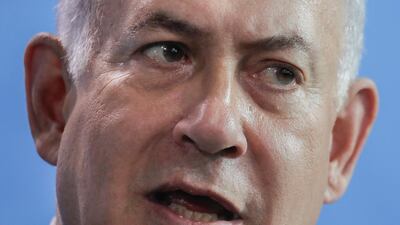Benjamin Netanyahu, the Israeli prime minister, sought to convince French President Emmanuel Macron that the 2015 Iran deal was fatally flawed at a meeting at the Elysee Palace in Paris on Tuesday night.
On the second stop of a three-country European tour, Mr Netanyahu seized on comments by Iran announcing it would soon open a site for producing new centrifuges to increase its uranium enrichment capabilities.
Mr Netanyahu said Tehran having nuclear weapons was “the greatest threat to the world”.
“The nuclear archive that we uncovered recently proves that Iran lied to the world about its nuclear weapons programme. And I believe now is the time to apply maximum pressure on Iran, to make sure that their nuclear programme doesn’t go anywhere,” he said.
Mr Macron said the pair had a long discussion about preserving stability in the Middle East, including the "military presence of Iran" in the region. He added that France remained committed to the Iran deal but also wanted to address the period after 2025 and Iran's ballistic missile build-up. "We have had a discussion that has allowed us to make progress on working together," he said. "The 2015 agreement is a stepping stone that needs to be preserved and built on."
The Israeli leader has been buoyed in his campaign against the deal by US President Donald Trump’s withdrawal but faces a struggle to persuade Europeans to abandon their efforts to salvage the deal.
Iran’s nuclear chief Ali Akbar Salehi said the expansion was allowed under the accord, and "does not mean the negotiations [with Europe] have failed" but experts fear the country is preparing the way for the deal to collapse.
"If conditions allow, maybe tomorrow night at Natanz, we can announce the opening of the centre for production of new centrifuges," he said.
The International Atomic Energy Agency, the world's top nuclear watchdog, confirmed it had received a letter from Iran, which Mr Salehi said was submitted on Monday and outlined Tehran's plans.
Under the 2015 nuclear agreement that Iran signed with world powers, it has the right to build and test certain centrifuges, although detailed restrictions exist for the first 10 years on the types and quantities of the machines.
Iran's Supreme Leader Ayatollah Ali Khamenei also appeared to reiterate Tehran’s pledge to wipe out Israel. Mr Netanyahu said Iran was duping the West, exploiting the break from sanctions to build up its financial reserves before returning to its nuclear plans.
"The day before yesterday Ayatollah Khamenei, the ruler of Iran, declared his intention to destroy the state of Israel," Mr Netanyahu said. "We are not surprised. We will not allow Iran to obtain nuclear weapons.”
Mr Netanyahu met German Chancellor Angela Merkel in Berlin on Monday, and will travel on to London for a meeting with British Prime Minister Theresa May on Wednesday.
Germany also favours a continuation of the Iran nuclear deal despite the departure of the US from the agreement. "There's not agreement on every issue but we're friends and there's a will to understand the other's position," Mrs Merkel said.
The Israeli leader also warned on Tehran’s role in the Syrian conflict, addressing German sensitivities over the wave of migration from the Middle East in recent years. Iran is intent on fuelling "a religious war inside Syria and the consequences will be many, many more refugees, and you know where exactly they will come," he told Mrs Merkel.
A briefing prepared by The Britain Israel Communications and Research Centre, a pro-Israeli lobby group, said the Israeli leader would not reverse Europe’s position on the trip.
“While EU leaders have acknowledged that the JCPOA is 'not perfect' and stated their willingness to negotiate a supplementary deal with Tehran covering its ballistic missile programme, interventions in the region and sunset clauses, they have been at pains to emphasise that they see the JCPOA agreement as the best guarantee against an Iran with nuclear weapons,” it said. “In this context, there is little Netanyahu can say or do that will sway May in her position.”
French officials said that Mr Macron also raised the issue of the Palestinian territories. European leaders have voiced deep concerns over Israel's use of live fire during recent Palestinian protests along the Gaza border with Israel, including Mr Macron, who condemned Israel's "heinous acts".
Relations between Israel and the European Union had already been strained by the killing of 123 Palestinian protesters in Gaza by Israeli forces since March.


